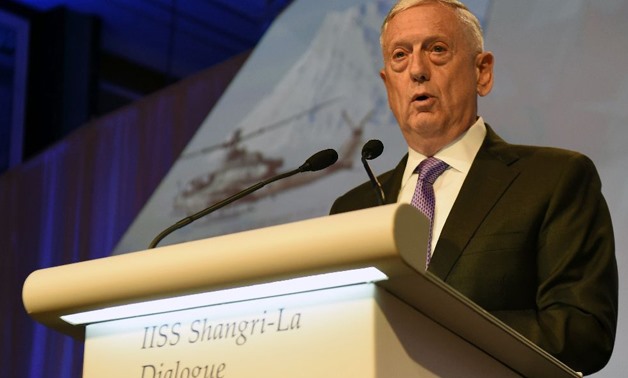
Pentagon chief Jim Mattis - AFP
Singapore - 3 June 2017: Pentagon chief Jim Mattis moved to reassure Asian allies Saturday that the United States could work with China on reining in North Korea's nuclear weapons programme without compromising its opposition to Beijing's continued "militarisation" of the South China Sea.
President Donald Trump -- who frequently denounced China on the campaign trail -- has turned to Beijing to help pressure Pyongyang, prompting broad concerns that America will go easy on China's maritime activities.
Longstanding partners are also jittery that Trump has seemed indifferent to traditional alliances, and have interpreted his pulling out of a trans-Pacific trade deal and the Paris climate accords as signs of broader American disengagement.
Mattis, arguably Trump's most important statesman as the new president tries to slash the State Department, tried to reassure allies on all counts.
"In the security arena, we have a deep and abiding commitment to reinforcing the rules-based international order, a product of so many nations' efforts to create stability," Mattis said in Singapore at the Shangri-La Dialogue, a major defence summit for countries from the Asia-Pacific region and beyond.
Calling North Korea's nuclear ambitions a "threat to us all," Mattis asked the international community to come together on the issue.
It is "imperative that we do our part each of us to fulfill our obligations and work together to support our shared goal of denuclearisation on the Korean Peninsula," Mattis said.
"The Trump administration is encouraged by China's renewed commitment to work with the international community toward denuclearisation," Mattis said.
Pyongyang on Monday test-fired another rocket, the latest in a series of launches and atomic tests that have ratcheted up tensions over its quest to develop weapons capable of hitting the United States -- something Trump has said "won't happen".
The defence chief spoke directly to concerns America might grant concessions to China to ensure cooperation on North Korea, saying the issue was not "binary" and that the United States would continue to pressure Beijing elsewhere.
"Artificial island construction and indisputable militarisation of facilities on features in international waters undermine regional stability," Mattis said, calling China out over its "disregard for international law" and "contempt for other nations' interests."
The US Navy on May 25 conducted a "freedom of navigation" operation in the South China Sea, when the USS Dewey guided-missile destroyer sailed within 12 nautical miles of Mischief Reef in the Spratly Islands.
China claims nearly all of the South China Sea, despite partial counter-claims from Taiwan and several southeast Asian nations including the Philippines, Brunei, Malaysia and Vietnam.
It has rapidly built reefs into artificial islands capable of hosting military planes and other military equipment.
- 'Unbeliever' -
Summit delegates were clearly anguished by the South China Sea issue and Trump's intentions.
One questioner asked if the US president was an "unbeliever" in the rules-based regional order. Another wondered if he could be trusted given his "America First" pronouncements.
"Bear with us," Mattis said. "We will still be there, and we will be there with you."
Japanese Defence Minister Tomomi Inada later said she placed "full trust" in the United States, a sentiment echoed by Australian Defence Minister Marise Payne.
"It didn't take Secretary Mattis's speech this morning to reassure me of the attitude and engagement of the United States in the region," Payne said.
"I think actions speak as loud if not occasionally louder than words," she said pointing out that Mattis' first international visit was to Japan and the South Korea.
After meeting with President Xi Jinping in April, Trump, who once accused China of "raping" the US, praised its leader as a "good man", saying it would be inappropriate to pressure Beijing while Washington is seeking its help with Pyongyang.
International pressure ramped up on Pyongyang Friday as the UN Security Council imposed sanctions on 18 North Korean officials and entities.
The council unanimously adopted a US-drafted resolution that put North Korea's suspected spy chief, 13 other officials and four entities on the UN sanctions blacklist, hitting them with a global travel ban and an assets freeze.
In Singapore Mattis also warned of other regional threats, including violent militants such as Islamic State fighters returning from the Middle East.

Comments
Leave a Comment